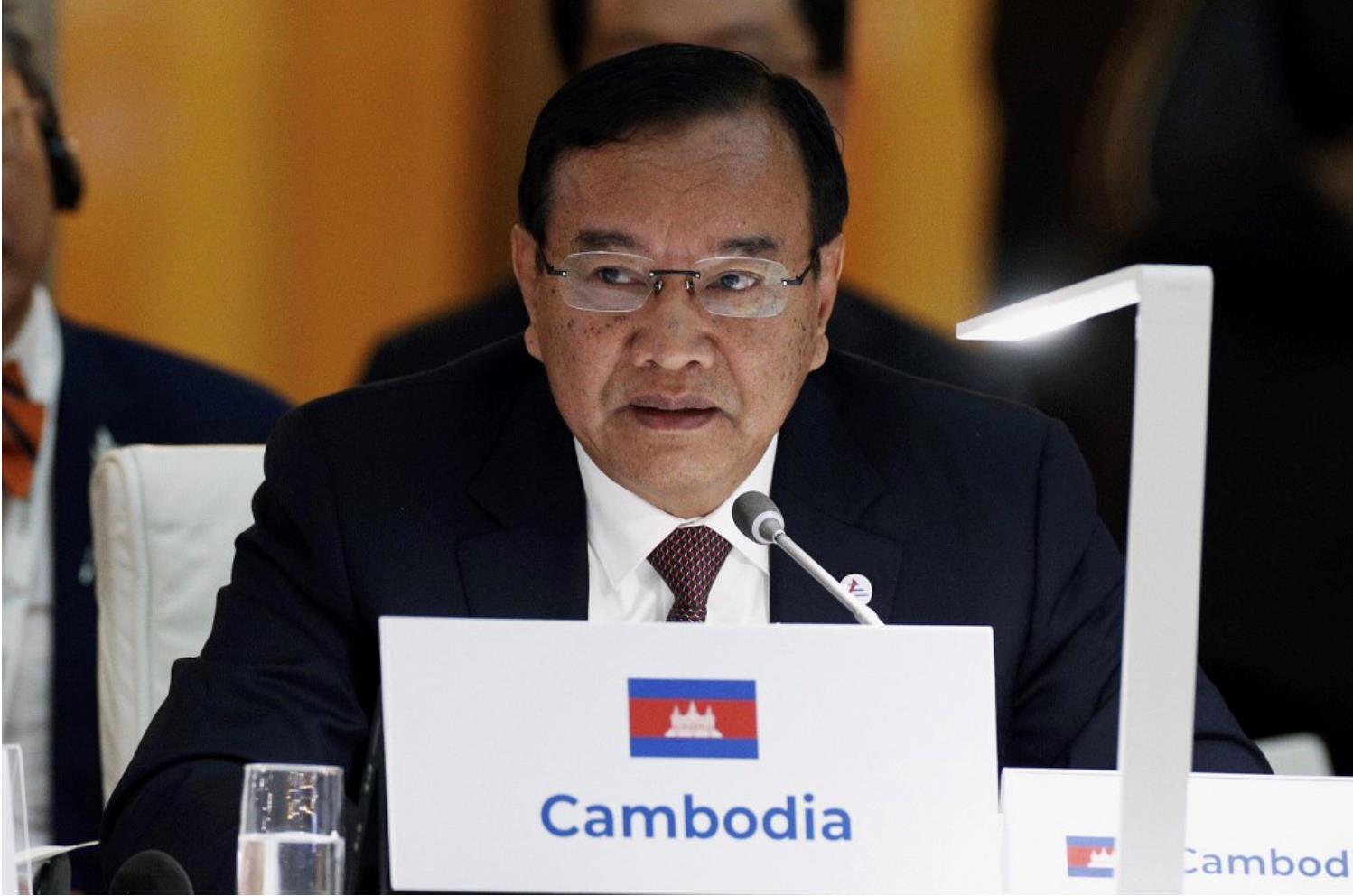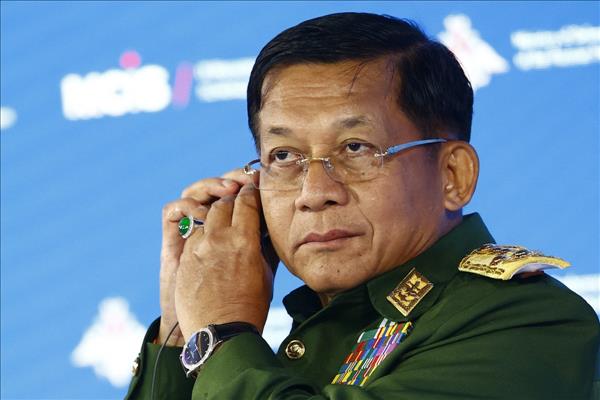Time To Bounce Myanmar From ASEAN?
Whoever devised the motto for the Association of Southeast Asian Nations (ASEAN) in 2022 must be experiencing distressing chagrin following early August's ASEAN Foreign Ministers Meeting (AMM).
“Addressing Challenges Together” rings less resounding as a theme with the Myanmar military regime's aggressive recalcitrance to work with the regional grouping on anything of substance.
Since agreeing to a“Five Point Consensus” in Jakarta in April 2021 following a February military coup, Myanmar's State Administration Council (SAC) has since been trying ASEAN's patience, which appears to be, at least in an ASEAN context, at breaking point.
SAC leader Senior General Min Aung Hlaing has been excluded from high-level ASEAN meetings since the October 2021 Summit, which the Singaporean foreign ministry called“a difficult but necessary decision to uphold ASEAN's credibility given the unsatisfactory and highly limited progress” on the consensus points.
This month's formal AMM statement had strong words of warning to Naypyidaw :“We extensively discussed the recent developments in Myanmar and expressed our concerns over the prolonged political crisis in the country, including the execution of four opposition activists…(w)e were deeply disappointed by the limited progress in and lack of commitment of the (SAC) authorities…and consistent with Article 20 of the ASEAN Charter, we recommended that the ASEAN Summit assesses the progress.”
The day after the annual meeting, current ASEAN Special Envoy and Cambodian Foreign Minister Prak Sokhonn told a press conference,“I am…just a special envoy, not a superhero or a superman. I think even a superman cannot resolve the Myanmar issue [overnight]. I will not give up on Myanmar,” as he pledged to return to the war-wracked country for a third trip in September.
Following his last visit, Prak bemoaned that he wasn't a magician that could solve the impasse. At this pace, he will require divine powers to produce anything resembling progress.

Cambodian Foreign Minister Prak Sokhonn is no diplomatic superman. Image: Pool
Min Aung Hlaing has been blowing raspberries at Cambodia since it assumed this year's rotating chair of ASEAN, deluding Prime Minister Hun Sen he would release imprisoned Australian economist Sean Turnell and would permit Prak to visit Aung San Suu Kyi, among other rebuffs.
Singapore's Foreign Minister Vivian Balakrishnan told reporters on the last day of the AMM that,“I have to be very frank. It's very dire. I think there is a real danger that the coup is sliding into a civil war.”
A few things are remarkable about these comments. The first is such strong words from a Singaporean diplomat. Then his civil war remark, which suggests he really hasn't been paying close attention to Myanmar where a civil war has been raging for over a year, on top of the 70-year-long ethnic conflict.
And third, that Singapore is an active supporter of arms and material to the main aggressor and war criminals of that civil war, the Myanmar military. A report on August 11 by Justice for Myanmar outlined comprehensive arms and support sales by Singaporean companies to the Myanmar military over the past several years. This doesn't bode well for the kind of sustained redirection ASEAN needs to make.
The AMM attendees' evident anger had two interrelated factors. The first was a year of mounting frustration at the lack of any discernable purchase on the agreement Min Aung Hlaing had made, the humiliation many in ASEAN must feel that even they can't wring an insincere concession out of the Myanmar military, and that there are far more important trade, security and post-pandemic cooperation priorities without Myanmar persistently being the albatross around the neck of regional cooperation.
But it was the execution of dissidents Ko Jimmy, Ko Phyo Zeyer Thaw, Hla Myo Aung, and Aung Thura Zaw that repulsed ASEAN, which was made clear in a joint statement soon after the state murders in late July.
What is behind the SAC's stonewalling? After all, even perfunctory, performative cooperation with ASEAN would assuage the peripatetic West, soothe the United Nations into further entrenched inactivity and convince the international media that ignoring Myanmar is justified.
Take some meetings, stage a fake prisoner amnesty, frontload civilian diplomats in interactions rather than SAC Stormtroopers, sanitize the post-coup crime scene with smoke and mirrors: it's all ASEAN wants. Instead, there is increased violence across the country, an implausible peace process and duplicitous elections being planned for 2023.

Myanmar's military faces near nationwide resistance since staging a February 1, 2021 coup. Photo: Facebook
What does Article 20 of the ASEAN Charter portend? It literally states:“As a basic principle, decision-making in ASEAN shall be based on consultation and consensus…Where consensus cannot be achieved, the ASEAN Summit may decide how a specific decision can be made…in the case of a serious breach of the charter or non-compliance, the matter shall be referred to the ASEAN Summit for decision.”
This kicks the can down the road a few months, giving Min Aung Hlaing some breathing space. But evoking this Article indicates ASEAN might be prepared for some more punitive action.
It's still highly doubtful ASEAN would ever expel a member state, which would require motivation and resolve the bloc lacks. But it could potentially go some way to putting Naypyidaw on heightened alert if the preliminary steps to possible excommunication keep coming, from disinviting Min Aung Hlaing last year to considering temporary suspension at the summit this year.
1997, the year Myanmar joined, the regional grouping delayed Cambodia's ascension over Hun Sen's violent coup against Prince Ranariddh. The threat of non-ascension didn't last long, though: Cambodia was permitted to sign the ASEAN Charter in November 2007 as planned (along with then-Myanmar prime minister General Thein Sein).
It underscores the depths of despair ASEAN must be feeling if Hun Sen and Cambodia are so obviously upset with the way things are going in Myanmar. But this comparison ends badly. There was a Japanese-brokered“Four Pillars” peace plan, which has some unsettling echoes with the Five Point Consensus, and eventually rigged elections in July 1998 in Cambodia. That“peace plan” allowed Hun Sen to forge a thuggish plutocracy that has lasted for 24 years.
The Myanmar military usually doesn't react well to threats and habitually looks for a club with which to beat problems away. Min Aung Hlaing's caveman diplomacy is devoid of the cunning that previous military leaders have demonstrated in being able to manipulate foreign maneuvering. But what further regional isolation will mean to other senior SAC military and civilian leaders is impossible to predict.
Myanmar's Ministry of Foreign Affairs (MOFA) and the state propaganda machine seemed to scramble for damage control days after the AMM.
The junta's Burmese language Myanmar Alin and its English stablemate The Global New Light of Myanmar ran laudatory ASEAN interviews with MOFA Permanent Secretary Chan Aye and Ministry of Investment and Foreign Economic Relations Permanent Secretary Dr Wah Wah Maung, painting attempted portraits of virtuous membership.
Another article from MOFA extolled the virtues of the ASEAN Coordinating Center for Humanitarian Assistance (AHA-Center), which is pursuing one of the Five Points to coordinate humanitarian assistance. Its“Joint Needs Assessment” conducted recently stated:“Myanmar is eagerly awaiting efforts to secure the second phase of provision of the humanitarian assistance as the government of Myanmar has given [a] green light to do so in Mon State, Shan State, Kayah State, Rakhine State, Bago Region, Magway Region and Sagaing Region.”
Many of these regions are experiencing high levels of violent conflict and massive emergency needs with an estimated over one million internally displaced. The AHA Center is so ill-suited for the task of coordinating war zone humanitarian aid that its former director, Adelina Kamal, has written convincingly numerous times since late 2021 that this approach will not and cannot work, and has suggested far more principled and realistic alternatives.

In this file photo taken on February 11, 2021, protesters step on a banner showing an image of Myanmar military chief Senior General Min Aung Hlaing during a demonstration in Yangon against the military coup. Photo: AFP / Stringer
In his“state of the union” speech marking 18 months since the coup, Min Aung Hlaing claimed that“(w)ith the lack of stability in the country, implementing the ASEAN Consensus at the time was challenging…as the situation has improved on all fronts, we are implementing the (consensus) to the extent we can within the ASEAN framework. We are also striving to prevent any encroachment upon our internal affairs…(and) the sovereignty of the state. As the country begins to achieve normalcy, we will be able to make progress.”
In other words, the check is in the mail. What he really meant to convey was,“ASEAN, your reality check bounced.” He was more polite in his address marking the 55th anniversary of ASEAN , which fell on August 8, a day remembered in Myanmar marking the 1988 Uprising.
It all seems so far away from those halcyon days of Shwe Myanmar a-thit (New Golden Myanmar) when the Thein Sein administration served as ASEAN's rotational chair of in 2014. The motto that year was“Moving Forward in Unity to a Peaceful and Prosperous Community.” Eight years on, a recalcitrant Myanmar is dragging the bloc backward into a new era of war, instability and crisis.
David Scott Mathieson is an independent analyst working on conflict, humanitarian and human rights issues on Myanmar

Legal Disclaimer:
MENAFN provides the
information “as is” without warranty of any kind. We do not accept
any responsibility or liability for the accuracy, content, images,
videos, licenses, completeness, legality, or reliability of the information
contained in this article. If you have any complaints or copyright
issues related to this article, kindly contact the provider above.
Most popular stories
Market Research

- 1Inch Becomes First Swap Provider Relaunched On OKX Wallet
- Betfury Is At SBC Summit Lisbon 2025: Affiliate Growth In Focus
- LYS Labs Moves Beyond Data And Aims To Become The Operating System For Automated Global Finance
- Ethereum Meme Coin Little Pepe Crosses $25M, Announces 15 ETH Giveaway
- Phase 6 Reaches 50% Mark As Mutuum Finance (MUTM) Approaches Next Price Step
- Mutuum Finance (MUTM) Raises $16 Million While Advancing Toward Platform Release






















Comments
No comment